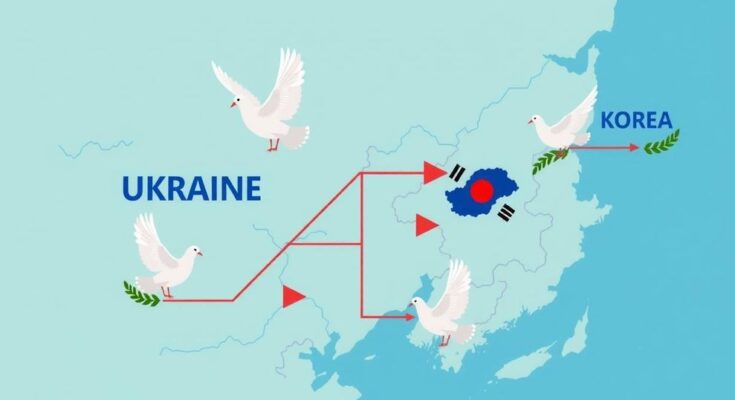South Korean and Ukrainian diplomats have discussed the repatriation of two captured North Korean soldiers. The soldiers’ willingness to seek asylum is essential under South Korean law. The talks arise from North Korea’s troop deployments to assist Russia in the conflict, leading to significant casualties among North Korean forces. The situation is complex, with implications for humanitarian, military, and diplomatic relations.
On March 17, 2025, diplomats from South Korea and Ukraine convened to discuss the repatriation of two North Korean soldiers captured during the ongoing conflict involving Ukraine and Russia. South Korean Foreign Minister Cho Tae-yul engaged with Ukrainian counterpart Andrii Sybiha, advocating for the transfer of the Democratic People’s Republic of Korea (DPRK) soldiers. The discussions emphasize that the captured soldiers’ willingness to seek asylum is critical, as South Korean law recognizes North Koreans as citizens under its Constitution, albeit conditional upon their expressed intention for relocation.
The negotiations are prompted by North Korea’s substantial troop deployments to Russia, intended to bolster military efforts amid significant Requisition challenges faced by Moscow. It is estimated that approximately 12,000 North Korean soldiers were sent to Russia’s Kursk Oblast last fall, coinciding with increased cross-border activities by Ukraine. Early estimates from Ukrainian intelligence indicate that over 4,000 North Korean soldiers have incurred casualties, with a significant number reportedly killed in action, escalating concerns about North Korea’s involvement in the conflict.
Captured alive on January 11, 2025, the two North Korean soldiers represent a historic first, having survived such engagements. They have received medical treatment and are currently under the custody of the Security Service of Ukraine (SBU). Their capture occurs in the context of increased hostilities, with Ukrainian forces having previously detained another North Korean soldier who later succumbed to his injuries.
Seoul has longstanding ties with North Korean affairs, accepting around 34,000 defectors since the late 1990s. While this provides precedence for accepting the soldiers, it also poses diplomatic complexities. Although offering sanctuary could enhance South Korea’s humanitarian image, it risks exacerbating tensions with both North Korea and Russia, complicating the situation further.
The National Intelligence Agency of South Korea indicated that, as of January, the captured soldiers had not indicated any desire to defect. This raises concerns about further troop deployments from North Korea should the situation not improve, as indications suggest preparations for sending additional soldiers are underway following notable casualties.
In combat, North Korean troops have shown significant involvement, with Ukrainian official Andriy Kovalenko noting their aggressive tactics on the frontlines. This recognition underscores the heightened security tensions in the region, with analysts asserting that North Korean military strategies have led to severe losses on the battlefield, attributed to their lack of combat experience.
Sybiha remarked on X, appreciating South Korea’s partnership and emphasizing the urgent need to tackle the burgeoning Russo-North Korean cooperation, which poses risks to security across Europe, the Korean Peninsula, and the Indo-Pacific.
As discussions progress, the silence from North Korea regarding the potential relocation of the captured soldiers presents an enigmatic aspect of this interplay. It suggests that North Korea may be strategizing to leverage the situation diplomatically or that the soldiers are hesitant to engage in negotiations that could render them pawns in international diplomacy.
Yeonmi Park, a North Korean defector and critic, expressed her dissent on social media, accusing Ukraine of contravening international law by linking prisoner repatriation to arms trading, highlighting the tension between humanitarian issues and military strategies.
Ukrainian President Zelensky acknowledged the perilous nature of capturing North Korean personnel, emphasizing the risks faced by Ukrainian forces. He remarked on the brutal conditions imposed by Russian and North Korean forces, illustrating the dangers involved for all parties.
The trajectory of this situation may yield significant political implications moving forward. North Korea’s continued silence regarding the potential acceptance of these soldiers underscores ongoing complexities in a relationship shaped by years of contention, as the involved nations navigate alliances and humanitarian standards amid ongoing warfare.
The negotiations between South Korea and Ukraine regarding the potential repatriation of captured North Korean soldiers illuminate the intricacies of international diplomacy amid conflict. The soldiers’ willingness to seek asylum plays a crucial role in the outcomes. With North Korea’s silence and the broader implications of this interaction, it remains to be seen how humanitarian concerns will be balanced against strategic military interests and alliances.
Original Source: evrimagaci.org




